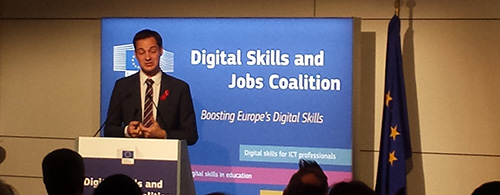 In discussion with Artur Banaszkiewicz, reporting from the Launch of Digital Skills and Jobs Coalition
In discussion with Artur Banaszkiewicz, reporting from the Launch of Digital Skills and Jobs Coalition
“Europe is lagging behind in digital skills! We have many initiatives all over the continent but they are not doing enough to address the skills gap all industries are facing” – this seems to be one short statement that sums up the Launch of the Digital Skills and Jobs Coalition, which took place in Brussels on 1 December 2016.
The Coalition is a multi-stakeholder partnership to tackle the lack of digital skills in Europe. Coordinated by the European Commission and Digital Europe, it brings universities, governments and companies together in an effort to discuss solutions to the skills deficit (currently estimated at over 750 000 digital or ICT-related vacancies difficult to fill across Europe), promote skills that are needed by business and industry and provide upskilling to Europeans. Taking the fact that 18 million Europeans have never used the Internet, and 37% of EU labour force do not have basic digital skills (as Commissioner Gunther Oettinger quoted in his address), there is a lot to be done.

It may have quite an impact if the stakeholders achieve their pledges and get involved in a broader way in promoting skills development. 99pc of the jobs existing 100 years ago don’t exist today and 47% of jobs existing today will not exist in 10 years’ time. As Jorge Schnura noted, “we need for people to be able to update their skillset constantly, on regular a basis as the technology is changing every few years. We need to embed that mind-set of change and improvement in society“.
There were 13 national coalitions set up and over 30 organisations pledged to help achieve the coalition’s goals. Digital Skills pledged to upskill a total of 10,000 professionals by 2020, to help bridge the digital skills gap by providing innovative digital skills training that meets the skill demands of industry.
A lot was said about the education systems designed a century ago, which neither match today’s learners’ needs nor the needs of businesses and industry. In 2030, Europe will need 20 000 more e-leaders than it is producing. That is why innovative education and blended learning methods are so important.